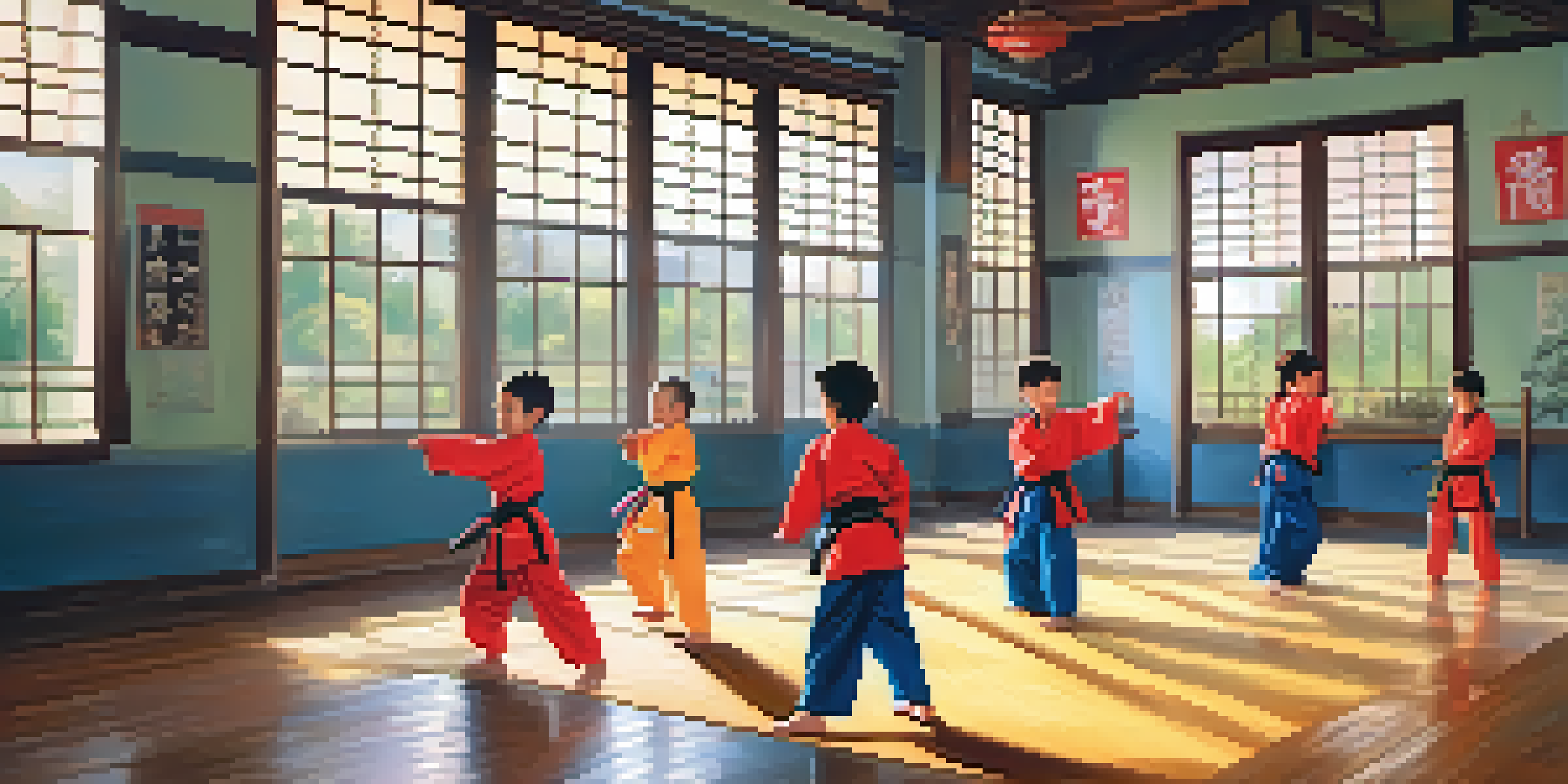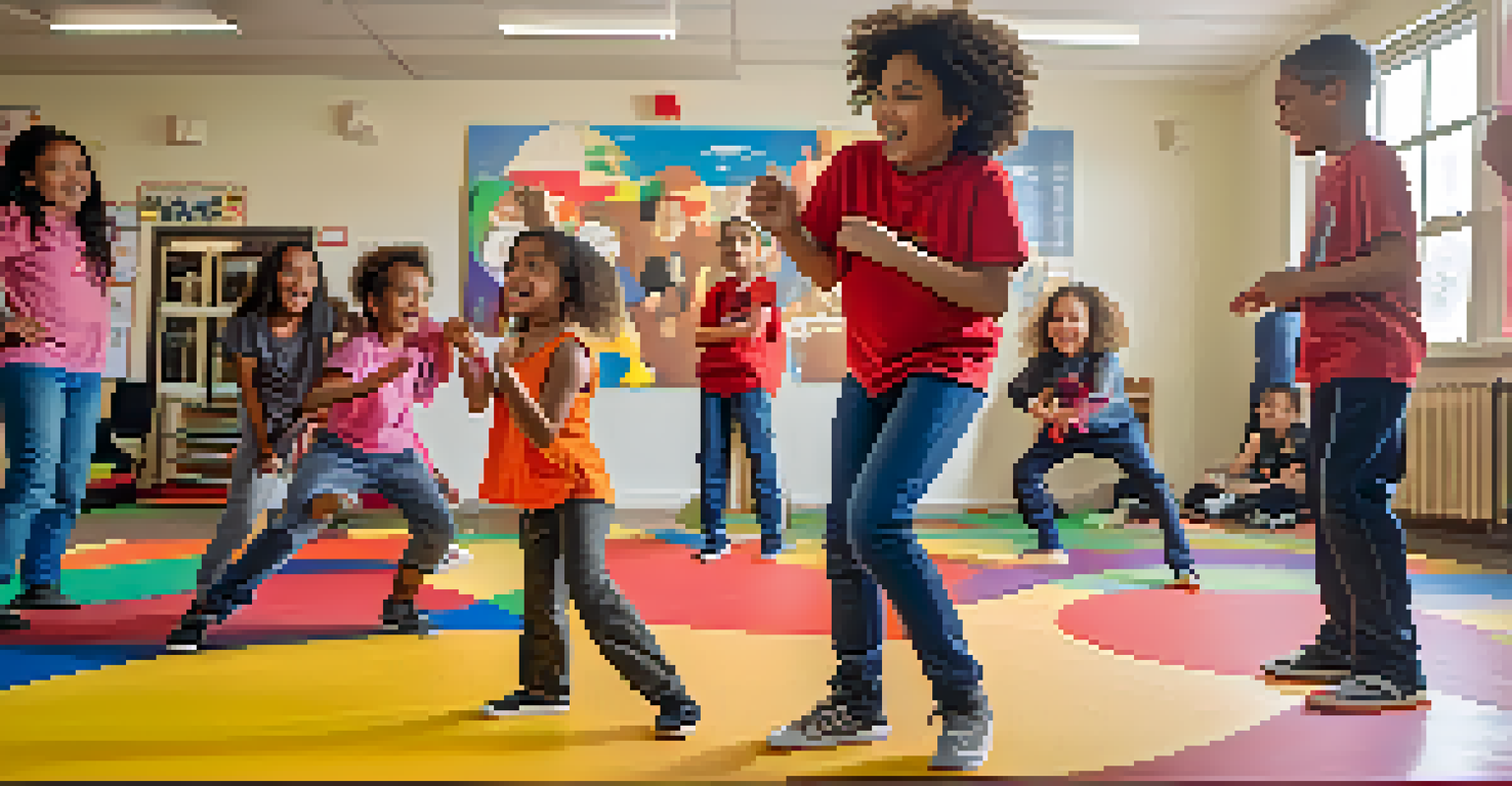Self Defense Training for Kids: Empowering Young Defenders

Understanding the Importance of Self Defense for Kids
Self-defense training is not just about physical techniques; it’s about empowering children with confidence and awareness. In today’s world, equipping kids with the skills to protect themselves can be crucial for their safety. It helps them understand their personal boundaries and the importance of standing up for themselves, both mentally and physically.
Self-defense is not just about physical techniques; it’s about empowering children with confidence and awareness.
Moreover, self-defense teaches children how to assess their surroundings and recognize potential threats. This awareness can prevent dangerous situations before they escalate. By understanding the 'what ifs' of various scenarios, kids can navigate their environments more safely and confidently.
Ultimately, introducing self-defense at a young age instills a sense of responsibility. Kids learn that with skills comes the duty to use them wisely, promoting not just personal safety but also respect for others.
Building Confidence through Self Defense Training
One of the most significant benefits of self-defense training is the boost in self-confidence it provides. As children learn new techniques and successfully practice them, they start to feel more capable of handling challenging situations. This newfound confidence often spills over into other areas of their lives, such as academics and social interactions.

The process of mastering self-defense skills can also help children develop perseverance. They learn that failure is part of the learning curve and that with practice, they can improve. Encouraging resilience in facing challenges not only prepares them for self-defense scenarios but also for life’s many ups and downs.
Empower Kids with Self-Defense Skills
Self-defense training equips children with confidence, awareness, and the ability to recognize potential threats.
Additionally, the supportive environment of a self-defense class fosters camaraderie among kids. They cheer each other on and celebrate each other's successes, which helps build a strong sense of community and belonging.
Key Self Defense Techniques for Young Learners
When it comes to self-defense for kids, simplicity is key. Techniques should be easy to understand and execute, focusing on moves that can quickly diffuse a situation. Common practices include basic strikes, effective escapes from holds, and techniques to create distance from an aggressor.
The best defense is a good offense, but the best self-defense is preventing the fight in the first place.
For instance, learning to shout for help or how to use their voice assertively can be incredibly effective. Teaching kids to identify safe places and trusted adults to turn to in an emergency is equally vital. These strategies empower children to take action without relying solely on physical confrontations.
Moreover, incorporating fun elements like role-playing scenarios can make learning these techniques more engaging. This not only helps reinforce the skills but also allows kids to practice responses in a safe and controlled environment.
The Role of Fitness in Self Defense Training
Self-defense training goes hand-in-hand with physical fitness. Regular exercise enhances strength, flexibility, and endurance, making it easier for kids to perform self-defense techniques effectively. Activities like martial arts, gymnastics, or even simple drills improve their overall physical condition.
Furthermore, physical fitness contributes to mental well-being. Exercise releases endorphins, which can help reduce stress and anxiety—a common issue among children. When kids feel physically strong, they are also likely to feel mentally tougher, which is essential in any self-defense situation.
Boost Confidence and Resilience
Learning self-defense techniques helps children build self-confidence and perseverance, which positively impacts other areas of their lives.
Encouraging a healthy lifestyle alongside self-defense training can lead to lifelong benefits. It promotes good habits and a positive mindset, helping children grow into confident and resilient adults.
Teaching Kids to Recognize and Avoid Dangerous Situations
Self-defense is not solely about fighting back; it’s also about prevention. Teaching kids how to recognize potentially harmful situations can be a game-changer. Role-playing scenarios where they practice assessing risks helps them develop instinctual responses to various situations.
For example, encouraging them to trust their gut feelings when something feels off can be incredibly empowering. They learn that it’s perfectly okay to walk away from a situation that makes them uncomfortable, reinforcing their ability to prioritize their safety.
Additionally, discussing strategies for avoiding conflict and seeking help can further enhance their safety. Kids should be aware of safe places, trusted adults, and how to call for help when needed.
The Benefits of Group Self Defense Classes for Children
Group self-defense classes provide a unique environment where children can learn and grow together. This shared experience fosters friendships and camaraderie among peers, which can be particularly beneficial for shy or introverted kids. They find that they are not alone in their fears and challenges.
Moreover, learning in a group setting allows for healthy competition and motivation. Kids can push each other to improve, celebrate each other's progress, and learn from one another. This collaborative spirit makes the learning experience more enjoyable and engaging.
Group Classes Foster Community
Participating in group self-defense classes promotes camaraderie, healthy competition, and personalized feedback from instructors.
Finally, group classes often include supportive instructors who can provide personalized feedback. This helps children refine their techniques and boosts their confidence as they receive encouragement from both peers and mentors.
How Parents Can Support Their Kids' Self Defense Journey
Parents play a crucial role in their children's self-defense education. Encouraging participation in self-defense classes can help children feel supported as they learn vital skills. Parents should express interest in what their kids are learning, which reinforces the value of these lessons.
Additionally, practicing self-defense techniques at home can strengthen their skills and increase family bonding. It’s a fun way to spend time together while reinforcing what they’ve learned in class. Parents can also engage in discussions about safety, helping kids think critically about various scenarios.

Lastly, celebrating their achievements—big or small—goes a long way in boosting their confidence. Recognizing their efforts and progress helps children understand that self-defense is an ongoing journey, and every step counts.